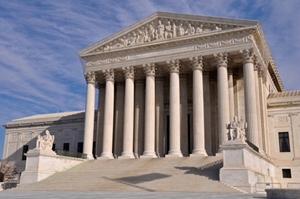When President Barack Obama officially repealed "don't ask, don't tell" more than a year and a half ago, it was signaled as a big win for gay and lesbian troops, but there is still a lot of work to be done when it comes to extending benefits to same-sex couples. Handcuffed by the Defense of Marriage Act (DOMA), the Pentagon currently denies gay military families nearly 100 individual benefits. However, changes might be in the works.
DOMA heads to SCOTUS
DOMA is one of the biggest obstacles in the path to extending military benefits to same-sex couples. The law, which was passed in the 1990s, prevents the federal government from recognizing any marriage that is not between a man and a woman. While this hamstrings efforts from the Obama administration to advocate for marriage equality, the situation may change in the next few months as DOMA heads to the Supreme Court.
Whether the Supreme Court declares DOMA unconstitutional is still up in the air, but public support for the bill is low, according to MSNBC. In fact, numerous surveys over the last year have shown that the majority of Americans support making gay marriage legal.
How are same-sex families hurt?
As one of his final acts as Secretary of Defense, Leon Panetta extended certain benefits – such as ID cards to get on base and legal assistance – to gay couples, but The Huffington Post reports there are still many that they cannot take advantage of. For instance, education benefits offered by the GI Bill, the coverage of reassignment costs and the Family and Medical Leave Act are all still unavailable. Rep. Adam Smith plans on introducing a bill that would redefine the word "spouse" under U.S. Code so that DOMA has no impact.
"The administration is doing what it can within the constraints that are in place, but the job is not done," he said earlier this year.
Obama opposes DOMA
Since officially announcing his support for gay marriage last year, President Obama has not been shy about voicing his opinion on DOMA. In February, his office released a brief that called the act unconstitutional. Specifically, the brief said that the law violates the equal protection clause of the 14th amendment.

